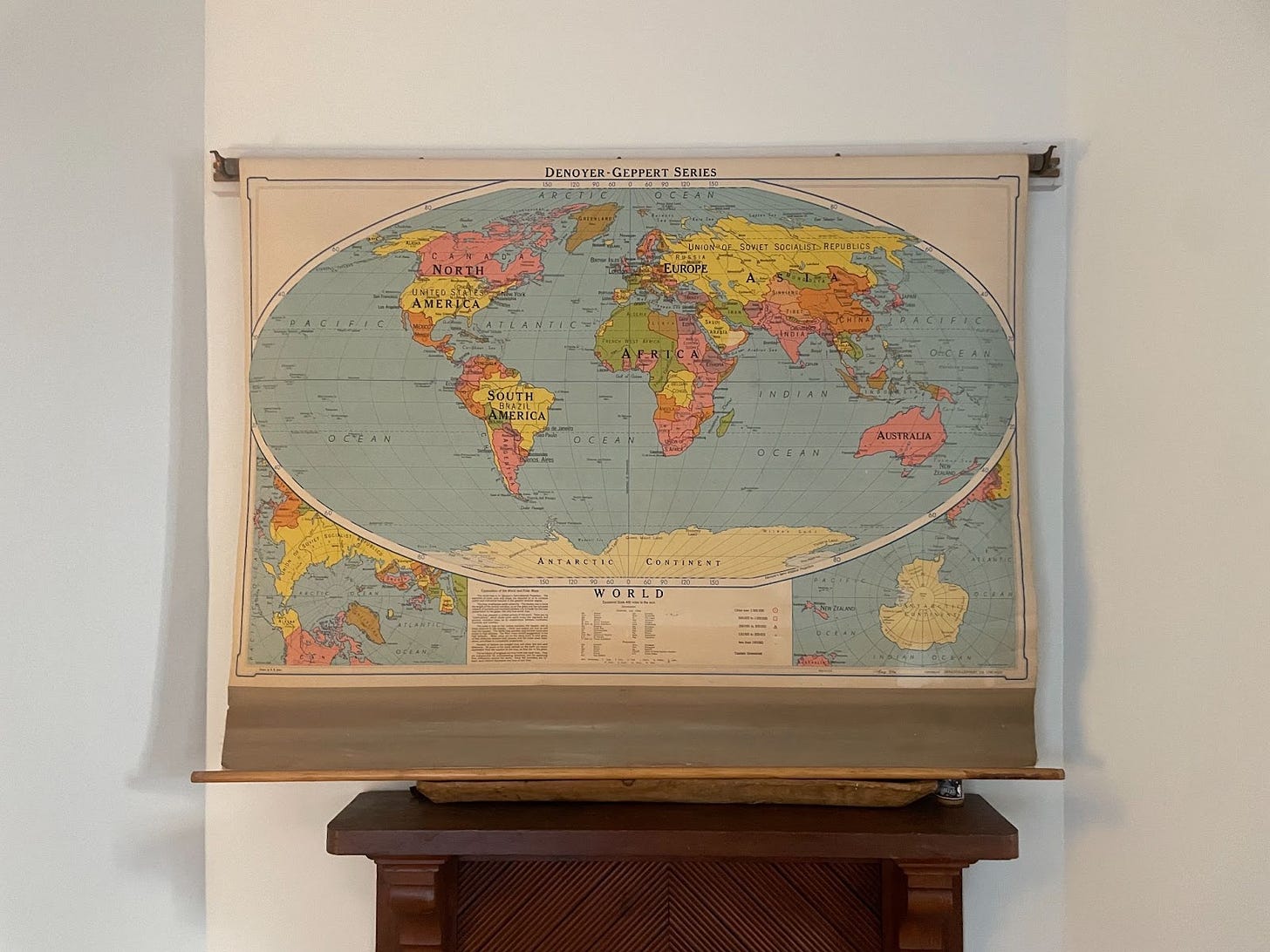Graydon Gordian | October 8, 2024
The Old Map Mystery Edition
On confused timelines, distracting your children, and living room sleuthing.
Graydon Gordian is the founder and CEO of the Backyard Care Company. He’s written WITIs about mosquitoes, rally racing, and Francis Mallmann, among other things.
Graydon here. I’ve got twins who turn three this month, which means that our television is a complicated and disappointingly prominent part of our lives. It is a source of conflict when getting ready for school, a lifeline in our most desperate moments, and oftentimes the only thing my wife and I have energy for once the day is finally over. At first, it was only allowed on the weekends, but eventually I needed to actually have my hands free to be able to make the kids a meal. From there, we’d quickly end up eating in front of the TV, and… you get my point.
There is, however, an old map above our TV, one of those classroom ones that rolls up and down. It was here when we moved in, and outdated as it is, it has been the solution to our problem. One day, in a desperate attempt to stave off watching Frozen for the 37th time, I decided to pull it down. When unrolled, it covered the TV entirely, and its impact was nothing short of magical.
When the map is down, it’s like the TV isn’t even there. Our kids are old enough to understand object permanence. They often ask for things in other rooms. They go in search of clothes or toys or expensive, breakable items that we wish they would forget exist. But for some reason, when the map is down, their interest in the TV evaporates. They go straight to their trains and dolls and balls. They play music and dance, build bridges out of blocks and tunnels out of pillows. The unrolled map has saved us from a screen-obsession spiral.
Why is this interesting?
When it comes time for my children to learn geography, however, this map will be nowhere near as helpful. The first thing you notice when you look up at it is the massive, faded yellow “Union of Soviet Socialist Republics.” As you look closer, you start to notice Ceylon and Somaliland. Yugoslavia and Czechoslovakia. East and West Pakistan. One or two things have changed since this map was made. Of course, I had to figure out when that was.
Africa was full of clues: Algeria, French West Africa and French Equatorial Africa are one continuous colonial expanse. There’s no Chad or Mali or Cameroon. If you look a bit further south you find the Belgian Congo, Rhodesia (Br.), and Tanganyika (Br.).
Fellow WITI contributor Ryan Anderson, who learned of my investigation over lunch recently, made two important breakthroughs when he noted that Colonia del Rio de Oro, featured on my map, only existed until 1958, while the Province of West Pakistan was formed in 1955—October 14th, to be exact. We were getting closer. The next African country to gain its independence after October 1955 was Sudan, which became its own state on January 1, 1956. But on the map, it’s still depicted as a British colony. There were only 78 days between the two events. Only 78 days in which the world looked like the map that hangs on my wall. How fulfilling, to have narrowed it down to such a small window.
I then sat down to write this WITI. But before I sent it off, I strolled back into the living room one more time and glanced up at the map, proud of my sleuthing. Suddenly, I noticed a little detail in the corner I had never seen before. “Drawn by R.B. Blair.” And just above it, in small print, “1951 Edition.” What? How could this be? West Pakistan didn’t even exist! Are you telling me that section of the map doesn’t represent West Pakistan but instead depicts the western part of Pakistan?
As part of my research I had looked up the independence day of Libya, which on the map is its own nation. December 24, 1951. Am I supposed to believe R.B. Blair drew this the week between Christmas and New Years in 1951? If he drew it after New Years, would the Denoyer-Geppert Company of Chicago, Illinois have labeled it the 1951 edition? Would he have depicted Libya as independent if he had drawn it sooner? The UN passed a resolution in support of Libyan independence in November 1949. Perhaps he saw it coming.
I have a lot of questions. I’ll keep digging for answers. It’s a lot more fun than watching TV. (GG)
